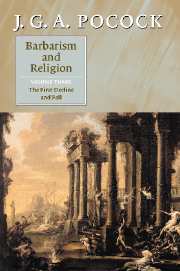Book contents
- Frontmatter
- Contents
- Acknowledgements
- Note on usages
- List of abbreviations
- Introduction
- PROLOGUE
- 1 Gibbon's first volume: the problem of the Antonine moment
- PART I THE FIRST DECLINE AND FALL: ANCIENT PERCEPTIONS
- PART II THE AMBIVALENCE AND SURVIVAL OF CHRISTIAN EMPIRE
- PART III THE HUMANIST CONSTRUCTION OF DECLINE AND FALL
- PART IV EXTENSIVE MONARCHY AND ROMAN HISTORY
- 11 Pedro Mexía: empire and monarchy
- 12 History in the western monarchies: barbarism, law and republican survivals
- 13 Lipsius and Harrington: the problem of arms in ancient and modern monarchy
- PART V REPUBLIC AND EMPIRE: THE ENLIGHTENED NARRATIVE
- PART VI GIBBON AND THE STRUCTURE OF DECLINE
- EPILOGUE
- Bibliography of works cited
- Index
13 - Lipsius and Harrington: the problem of arms in ancient and modern monarchy
Published online by Cambridge University Press: 15 December 2009
- Frontmatter
- Contents
- Acknowledgements
- Note on usages
- List of abbreviations
- Introduction
- PROLOGUE
- 1 Gibbon's first volume: the problem of the Antonine moment
- PART I THE FIRST DECLINE AND FALL: ANCIENT PERCEPTIONS
- PART II THE AMBIVALENCE AND SURVIVAL OF CHRISTIAN EMPIRE
- PART III THE HUMANIST CONSTRUCTION OF DECLINE AND FALL
- PART IV EXTENSIVE MONARCHY AND ROMAN HISTORY
- 11 Pedro Mexía: empire and monarchy
- 12 History in the western monarchies: barbarism, law and republican survivals
- 13 Lipsius and Harrington: the problem of arms in ancient and modern monarchy
- PART V REPUBLIC AND EMPIRE: THE ENLIGHTENED NARRATIVE
- PART VI GIBBON AND THE STRUCTURE OF DECLINE
- EPILOGUE
- Bibliography of works cited
- Index
Summary
Appian's history of the Roman civil wars, which explained the disintegration of the republic as the result of the failure of its military colonisation of Italy, became known in Greek to humanist scholars from about the year 1551. As we have seen, it could be linked with Tacitus' intimation that the Julio-Claudian principate had been only partly successful in bringing the armies of the imperium under its control; and Gibbon's use of this thesis in explaining the failure of the Antonine principate at the death of Commodus furnished him with a narrative of the ‘first decline and fall’ which looked back towards the failure of the republic itself. We have now to consider how it was that Appianic arguments became established in both erudite scholarship and civil philosophy, and pointed the way towards a restatement of Tacitism in the eighteenth century.
A major source of the revival of Appian may be found in the writings of the Modenese scholar Carlo Sigonio (1522/3–1584). He was not a historian of the wars or an analyst of military power – though we shall find him playing some part in shaping the thought of James Harrington – and his importance for our purposes lies at a distance from these themes. It is that he shows us the sixteenth-century intellect critically examining an association of ideas basic to the notion of Decline and Fall since we first encountered it in Sallust: that between libertas and imperium.
- Type
- Chapter
- Information
- Barbarism and Religion , pp. 276 - 304Publisher: Cambridge University PressPrint publication year: 2003



